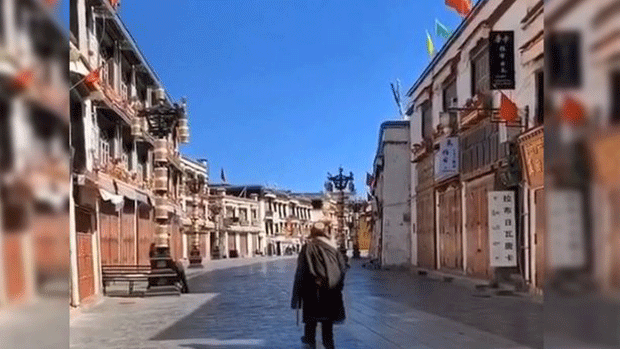Tibetet Segítő Társaság Sambhala Tibet Központ
Tibet Support Association Sambhala Tibet Center
székhely / telephely H-Budapest I. Attila út 123..
(00-36) 70 431 9343 (00-36)70 944 0260 (06-1)782 7721
sambhala@tibet.hu www.tibet.hu tibetpress.info
Facebook/Sambhala Tibet Központ Facebook/Tibett Segítő Társaság
MagnetBank/ 16200010-00110240
IBAN/HU94 16200010 00110240 00000000 SWIFT/HBWEHUHB
(1%) adószám/ 18061347-1-41
nyitva tartás/hétköznap 12.00-20.00 hétvégén előadás függő
» tibeti művészet» lapszemle.hu» thetibetpost.com» eastinfo.hu» rangzen.net» ChoegyalTenzin» tibet.net» phayul.com» DalaiLama.com» vilaghelyzete.blogspot.com» Videók» Linkek» TibetiHírek» Szerkesztőség
Tibetan Capital Lhasa Announces First Suspected Coronavirus Infection Case/ENG
2020. január 29./RFA/TibetPress
eredeti cikk
A suspected case of coronavirus infection has been announced in Tibet’s regional capital Lhasa as shops, hotels, and other public gathering places continue to shut down in the historic city.
The suspected carrier, identified only by his surname Zhang, arrived in Lhasa by train on Jan. 24 and is currently medically isolated and under observation, according to a notice on Wednesday by the city’s Municipal Health Committee.
“Patient Zhang, a 34-year-old male, comes from Suizhou city in Hubei province,” the announcement says. “[And] on the evening of Jan. 25, he went to a medical institution designated by the Tibet Autonomous Region [TAR] for treatment and admission.”
“On Jan. 28, based on clinical manifestations and laboratory tests by the Center for Disease Control and Prevention of the Autonomous Region, a suspected case of new coronavirus infection was determined,” the announcement said, adding that patient specimens have been sent to the Chinese Center for Disease Control and Prevention.
“At present, the patient’s vital signs are stable,” the announcement said.
Speaking to RFA’s Tibetan Service, a resident of Tibet now visiting the U.S. who recently canceled an airline ticket for a return home asked how Zhang could have evaded medical screening in Wuhan to slip unnoticed into Tibet.
“It is very strange that he was able to get a train ticket,” he observed. “This just shows the irresponsibility and inefficiency of government authorities in preventing this infectious virus from reaching Lhasa.”
'A top priority'
Also speaking to RFA, a Lhasa resident said that Tibetan People’s Hospital “and a few others” in the city are now designated facilities for screening for the coronavirus infection, now officially termed nCoV-2019 (Wuhan) by the World Health Organization (WHO).
“Higher authorities in the Tibet Autonomous Region have now made dealing with this virus infection their top priority in government affairs,” he said.
Videos in the Tibetan language are now being shown on television on how to guard against infection, RFA’s source said, adding, “And Tibet itself has been placed on an ‘emergency level 2’ status, next to China in urgency."
“Meanwhile, all places of public gathering in Lhasa have been closed down,” he said.
“Cafes and shops are all closed down, but the vegetable markets are still open, as I went there to buy some,” a Tibetan student living in Lhasa said, also speaking to RFA.
“We must put on face masks when we go outside, but my family and I don’t have any face masks to put on. The hospitals and shops have all run out of face masks, and the government can’t provide any to the people,” she said.
Meanwhile, four provinces of western and northwestern China historically populated by Tibetans—Gansu, Qinghai, Sichuan, and Yunnan—have confirmed 140 cases of coronavirus, state media reported on Tuesday.
The Lhasa-based China Tibet Broadcasting website did not reveal whether the patients are ethnically Tibetan or Han Chinese, but said they were being treated at designated hospitals.
Meanwhile, the number of people confirmed infected with the coronavirus rose to 13 in northwest China's Xinjiang Uyghur Autonomous Region (XUAR) on Wednesday from 10 a day earlier, according to state media, with 298 cases under medical observation.
Experts warned that poor conditions at internment camps could lead to an epidemic after authorities confirmed the first two cases in the region last week. Authorities have detained as many as 1.8 million Uyghurs and other Muslim minorities accused of harboring “strong religious views” and “politically incorrect” ideas in a vast network of the camps since April 2017.
Reported by Lobsang Choephel for RFA’s Tibetan Service. Translated by Dorjee Damdul. Written in English by Richard Finney.
